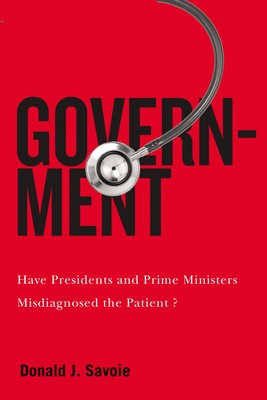
- We will send in 10–14 business days.
- Author: Donald J Savoie
- Publisher: McGill-Queen's University Press
- ISBN-10: 0228011094
- ISBN-13: 9780228011095
- Format: 15.2 x 23.6 x 2.8 cm, kieti viršeliai
- Language: English
- SAVE -10% with code: EXTRA
Reviews
Description
Citizens have lost trust in their institutions of public governance. In trying to fix the problem, presidents and prime ministers have misdiagnosed the patient, failing to recognize that government bureaucracies are inseparable from political institutions. As a result, career officials have become adroit at managing the blame game but much less so at embracing change. Donald Savoie looks to the United States, Great Britain, France, and Canada to assess two of the most important challenges confronting governments throughout the Western world: the concentration of political power and the changing role of government bureaucracy. The four countries have distinct institutions shaped by distinct histories, but what they have in common is a professional non-partisan civil service. When presidents and prime ministers decide to expand their personal authority, national institutions must adjust while bureaucracies grow to fill the gap, paradoxically further constricting government efficacy. The side effects are universal - political power is increasingly centralized; Parliament, Congress, and the National Assembly have been weakened; Cabinet has lost standing; political parties have been debased; and civil services have been knocked off their moorings. Reduced responsibility and increased transparency make civil servants slow to take risks and politicians quick to point fingers. Government astutely diagnoses the problem of declining trust in government: presidents and prime ministers have failed to see that efficacy in government is tied to well-performing institutions.
EXTRA 10 % discount with code: EXTRA
The promotion ends in 22d.14:02:30
The discount code is valid when purchasing from 10 €. Discounts do not stack.
- Author: Donald J Savoie
- Publisher: McGill-Queen's University Press
- ISBN-10: 0228011094
- ISBN-13: 9780228011095
- Format: 15.2 x 23.6 x 2.8 cm, kieti viršeliai
- Language: English English
Citizens have lost trust in their institutions of public governance. In trying to fix the problem, presidents and prime ministers have misdiagnosed the patient, failing to recognize that government bureaucracies are inseparable from political institutions. As a result, career officials have become adroit at managing the blame game but much less so at embracing change. Donald Savoie looks to the United States, Great Britain, France, and Canada to assess two of the most important challenges confronting governments throughout the Western world: the concentration of political power and the changing role of government bureaucracy. The four countries have distinct institutions shaped by distinct histories, but what they have in common is a professional non-partisan civil service. When presidents and prime ministers decide to expand their personal authority, national institutions must adjust while bureaucracies grow to fill the gap, paradoxically further constricting government efficacy. The side effects are universal - political power is increasingly centralized; Parliament, Congress, and the National Assembly have been weakened; Cabinet has lost standing; political parties have been debased; and civil services have been knocked off their moorings. Reduced responsibility and increased transparency make civil servants slow to take risks and politicians quick to point fingers. Government astutely diagnoses the problem of declining trust in government: presidents and prime ministers have failed to see that efficacy in government is tied to well-performing institutions.


Reviews